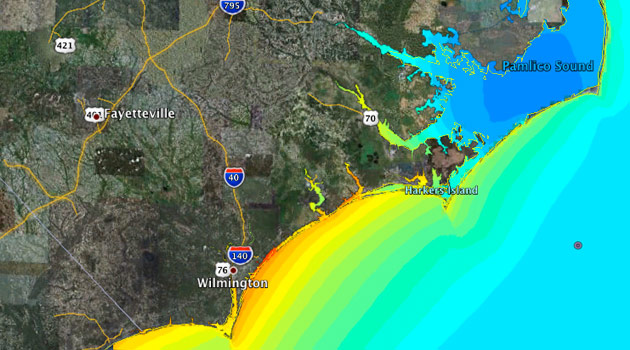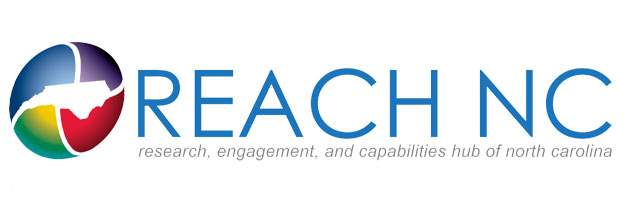
Scientists can’t control coastal flooding caused by storm surge. But they can help government agencies and the public understand the risks from storm surge and wind waves in vulnerable areas like North Carolina’s Outer Banks. Read more

Scientists can’t control coastal flooding caused by storm surge. But they can help government agencies and the public understand the risks from storm surge and wind waves in vulnerable areas like North Carolina’s Outer Banks. Read more
Researchers at RENCI’s UNC at Charlotte Engagement Center find that recession hits harder in neighborhoods with lower quality of life scores.
Read the full story here: http://ui.uncc.edu/story/charlotte-neighborhoods-recession-quality-of-life
This visualization starts with particles from a nuclear collision that are compressed and heated up to create a Quark-Gluon-Plasma (QGP), which looks like a “blob” in the video. Once the QGP expands and cools down, it decays again into particles that can be measured by the research team’s experiments. This is a so-called “hybrid’ model, that basically uses the Ultrarelativistic Quantum Molecular Dynamics model (UrQMD), a microscopic model used to simulate (ultra)relativistic heavy ion collisons, to model very early and late reaction stages in the process. The model has been combined with a relativistic fluid dynamics calculation to depict the formation and evolution of a Quark-Gluon-Plasma.
Duke University physicist Steffen A. Bass uses big chunks of computing time to study the behavior of some of the universe’s most fundamental particles—quarks and gluons, which existed in an unbound state up until about a micro-second after the Big Bang. Read more

CHAPEL HILL, Dec. 9, 2011–RENCI at the University of North Carolina, Chapel Hill and Duke University in partnership with IBM will lead a new project to build a nationwide test bed for networking and networked cloud computing. Read more
CHAPEL HILL–RENCI’s networking research group is part of a team that will design a blueprint for a future version of the Internet.
The University of Massachusetts, Amherst, leads the $2.7 million, three-year project, named ChoiceNet, which is funded by the National Science Foundation. In addition to RENCI at UNC Chapel Hill, North Carolina State University and the University of Kentucky have roles in the project. The project complements the work of the NSF program, Future Internet Architecture (FIA). FIA’s goal is to stimulate innovative and creative research to explore, design, and evaluate trustworthy future Internet architectures. Read more
RENCI’s Clark Jeffries and Dr. Diana Perkins of the UNC School of Medicine’s psychiatry department talk about their research that examines the genetic basis of schizophrenia in a Radio In Vivo interview.

CHAPEL HILL, NC – Sharlini Sankaran, formerly assistant director of the NC Department of Commerce Office of Science and Technology, has been named the first executive director of the Research, Engagement, and Capabilities Hub of North Carolina, or REACH NC. Read more
SEATTLE, Nov. 9, 2011 – The RENCI/North Carolina booth (#2942) will be one of several on the SC11 show floor to participate in a demonstration that will connect booths in the Washington State Convention Center with large data sets in the U.S. and Europe, creating a distributed, high-speed international data grid that allows researchers to share, store and manage large data sets. Read more
RENCI and its North Carolina partners at Duke and NC State universities will feature their work in an exhibit at SC11, the world’s premier conference for high performance computing, networking, storage and analysis, Nov. 14 – 17. Read more
SEATTLE, Nov. 1, 2011–Scientists studying data or compute-intensive problems require high bandwidth and computational resources, often from heterogeneous systems at different sites.
But they don’t need these resources all the time.
Ideally, a scientist studying the properties of new materials for producing solar energy, for example, would be able to grab a “slice” of a high-bandwidth pipeline, set their workflow in motion, grab compute resources in the cloud and then release those resources, so they could be used by other researchers in different configurations. Read more